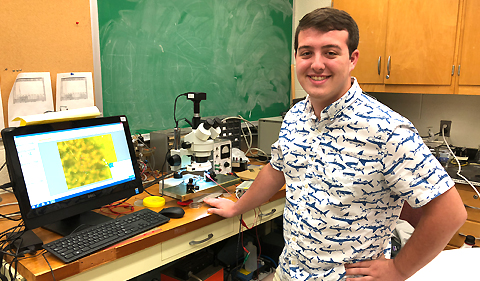By Graham Tupper
(B.S. Engineering Physics, Honors Tutorial College, Class of 2020)
My internship with Dr. Gang Chen in Physics & Astronomy last summer delved into the exploration of metal doped chalcogenides, specifically copper and silver doped germanium selenide (Cux(GeSe2)1-x and Agx(GeSe2)1-x respectively), and their possible use as memory devices. Through investigation, we discovered many interesting electrical properties, the main one being the traditionally insulating thin film becoming a conductor with the introduction of a current. I spent a lot of time testing many thin films, all with a varying amount of metal deposited within the chalcogenide, to study the dynamic properties of the resistance within the thin film.
The biggest thing I learned through this internship was how to do real scientific research. During class, I have had experience in individual experiments, or research in the way that I was gathering texts to support a persuasive essay. However, through my internship in the lab, I experienced the true form of research, where a physicist runs multiple experiments with the idea of reaching one result, but rather reaching multiple different ones that lead to new paths and phenomena to explore and explain.
A challenge I faced while exploring the research was mastering the lab equipment I needed to use to run my experiments. I faced with many different machines and a library of programs, each with their own purpose and required skills to use. Learning how to use these tools was no easy task, either, due to the fickle nature of running electrical experiments on fragile samples that required extreme precision and caution not to destroy.
Dr. Chen made himself very available throughout the summer, often coming in to the lab to observe the progress of the various experiments. In addition to this, his lab was very close to his office, making it easy to find him whenever in need.
This topic intrigues me because of how practical and tangible the subject is, yet how complex and unknown the physics behind the material is. The mission behind the research appeared very understandable to me, which was to create an improved memory device.
To any incoming student looking to pursue a physics internship, it might help to know when entering a lab, you may feel overwhelmed, and when beginning to work, you may find yourself frustrated. This is perfectly normal. I feel that many people see working in a physics lab as a binary: either you get it on the first try and continually succeed, or you will hit a wall and never get anything done. This is not true whatsoever. Physicists are humans, and working in a lab requires a lot of determination and motivation, because that next scan might just be what you need.




















Comments